- Home
- Register Here
- Products
- Download Center
- Collaborative Learning
- Biology Activities
- Music Activities
- Chemistry Activities
- Geography Activities
- History Activities
- Ancient & Modern Olympics
- Ancient Greek and Modern Education
- Antisemitism and Anne Frank
- Arachne
- Aztec Tributes Game
- Catch the Plague
- Egypt Quiz
- Greek Farming
- Greek Gods Identity Parade
- Henry VIII's Six Wives
- Medieval Snakes and Ladders
- Perseus and the Gorgon
- Slave Rebellions
- Technology and the Wilsons
- Tudor Entertainments
- Underlying Causes of First World War
- Victorian Working Life
- WW2 Air Raids
- Literacy Activities
- Buri and the Marrow
- Classic Tales
- Collection
- Complex Sentences
- Compound Nouns
- Consonant Clusters
- Don’t Cry Sly Fox
- Double or Single Consonants
- Feelings Synonyms
- Frequent Words
- Giant Turnip Rhyming Words
- Greek Word Detective
- Haiku
- Holes - Louis Sachar
- Improving Adjectives
- It could have happened, but in fact it didn't
- Macbeth - Close Look at Act One
- Macbeth - Macbeth's Feelings
- Macbeth - Two Minute Autobiography
- Macbeth Connect Four
- Not Again Red Riding Hood (Lotto Game)
- Not Again Red Riding Hood (Track Game)
- Oliver Twist
- Plural Monsters Machine and "One or More than One" Spelling Game
- Prefix Connect Four
- Prefix Pairs
- Punctuation Game
- Silent Letters
- Simile Bingo
- Sufficient Suffixes
- Suffix Trees
- The Elves and the Shoemaker
- The Giant Turnip (Bingo Game)
- Too Many Apostrophes
- Vowels (Connect Four)
- Maths Activities
- 12 and 24 Hour Clock
- Adding Two Digit Numbers
- Battle for Angle Forest
- Bigger or Smaller than Half
- Book Mystery
- Buy a Bear
- Change
- Decimal Street
- Doubling Cards
- Football Scores
- Four In a Row
- Fraction Frolics
- How Much How Many
- Maths Vocabulary
- Measuring
- More or Less (10-100)
- More than, Less than
- Number Balance
- Number Bonds
- Perfect Paint Palette
- Probability
- Regular Polygons
- Shape Monsters
- Transformations
- PSHE Activites
- Physics Activities
- Download Activities
- Interactive Demo
- Videos & Instructions
Collaborative Learning : Literacy Activities
| Title | Image |
|---|---|
Don’t Cry Sly FoxDescription: The track game has been devised to encourage pupils to explore the theme of food in relation to the Don’t Cry Sly Fox book and to reinforce the core vocabulary used. Learning Outcomes: Pupils will be able to name and recognise the various ingredients used to make the ‘chicken’, thus increasing their vocabulary. They will have had the opportunity to practice language structures as outlined in the core text information. |
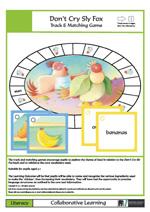 |
The Giant Turnip ( Bingo Game)Description: The bingo game has been devised to encourage pupils to explore the theme of growing vegetables in relation to the Giant Turnip book. The matching activity reinforces the learning of core words from the story. You might like to devise other ways of playing the game or substitute the vegetables with ones that pupils might be more familiar with. |
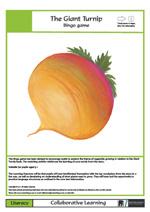 |
Feelings Synonyms ( Connect Four Game)Description: This game was developed to give pupils a richer level of vocabulary in a fun way. For the synonyms game we have concentrated on four feelings: happy, sad, angry and scared. You can adapt this game to include other feelings or translate the feelings into different languages. Learning Outcomes: Pupils will have developed a richer vocabulary for expressing feelings either aurally or in their writing. They will also have worked collaboratively with their partner.
|
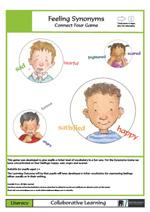 |
HaikuDescription: This game was designed to build confidence in producing poetry and also encourage speaking and listening skills. We have used animal haikus as the theme but you can adapt the activity to other themes or languages. Some cards have been left blank so that pupils can add their own animal haikus. Learning Outcomes: Pupils will be able to write and narrate their own haikus. They will also have worked collaboratively with their partner. |
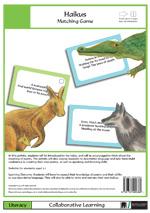 |
Frequent WordsDescription: The English language has some awkward, un-phonetic words which some children have trouble identifying and spelling, even when they are older. So this game has been devised to encourage young children to look at these words repeatedly, thus reinforcing their word recognition and spelling skills. Learning Outcomes: Children will have practised hearing and identifying high frequency words which will help with their spelling. |
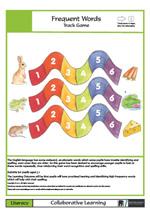 |
Silent LettersDescription: There are some words in the English language that have letters that are written but not pronounced - so called ‘silent letters’. Words containing silent letters are difficult to learn to spell, even for older children. This is why we have devised this activity to reinforce the learning of these awkward words, in a fun and interactive way. Learning Outcomes: Children will have practised and improved their spelling of words which contain silent letters. |
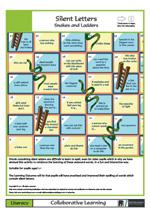 |
CollectionDescription: The Collections Game was developed to expand pupils’ vocabulary in a fun way. It will help them to identify items that are normally collected into groups such as bunches (flowers) or flocks (sheep). We have also provided spare blank cards for pupils to add more collective nouns or you could encourage them to make up their own for example, ‘What would you call a collection of computers?’ Learning Outcomes: |
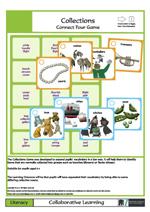 |
Macbeth Connect FourDescription: Macbeth is one of the most popular Shakespeare plays that many students study. To give them a greater understanding of the play we have focused on the main characters in a fun game of Connect Four with a twist. Learning Outcomes: Students will have gained a better understanding of the main characters in the play. |
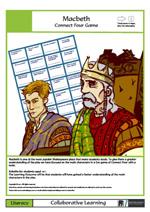 |
Classic TalesDescription: This game is designed to consolidate children’s knowledge of some well-known folk tales and increase their literacy skills. Learning Outcomes: Pupils will be able to define and describe the selected folk tales and identify the key themes, characters and settings. |
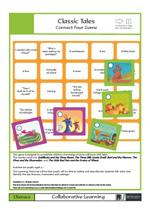 |
Simile BingoDescription: This game was developed to give students a richer level of vocabulary, in a fun way. It introduces some well known similes, and having seen how a simile is constructed students can then be encouraged to develop their own. If you make any interesting changes please send them to the address below so that we can expand our library of resources. Learning Outcomes: Students will have developed an understanding of how similes work and will be able to make up some of their own. |
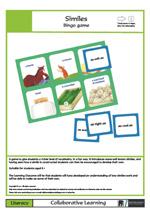 |
Sufficient SuffixesDescription: Suffixes can be difficult to join onto words and spell, so we devised this game to give students a fun way to practise adding suffixes. The game also encourages the development of the students’ vocabulary by making them think of their own words and how to spell them. Learning Outcomes: The Learning Outcome will be that students will have developed their literacy skills by practising the use of suffixes. |
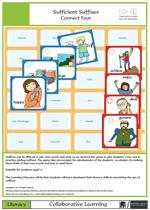 |
Giant Turnip Rhyming WordsDescription: This game was developed to give pupils a richer level of vocabulary in a fun way. It is best to first read The Giant Turnip book before starting the game. If you wish you can hear the story in various languages with your TalkingPEN and the appropriate audio files. Visit www.mantralingua.com for details. To further develop the theme of this book you can also use the companion activity Giant Turnip Bingo. Learning Outcomes: Pupils will have developed a richer vocabulary aurally as well as in their writing. They will also have worked collaboratively with their partner. |
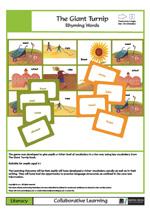 |
Compound NounsDescription: This activity was developed in order to familiarise students with compound nouns but it also illustrates the historical development of language. Some of the words are no longer in use and some like treadmill have developed a new meaning. The activity can be used both for literacy and history. Learning Outcomes: Students will have learned the meaning of compound nouns as well as having broadened their vocabulary. |
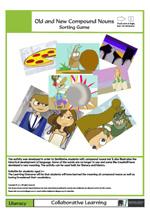 |
Vowels (Connect Four)Description: Spelling and phonics are vital in the learning of English and we have devised here a fun way for students to practise their vowel sounds and link them to the vowels used in various words. Learning Outcomes: The Learning Outcome will be that pupils will have developed their literacy skills by practising the use of vowels and spelling. |
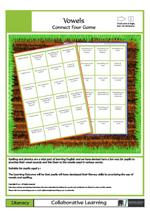 |
Double or Single ConsonantsDescription: Students learning English often find they are not sure when a word needs a double or a single consonant. This game provides a fun way to give them practice in identifying single and double consonant words. Learning Outcomes: Students will have improved their spelling by practising certain words and learning the reasons why, in general, some words have single consonants and others have double consonants. |
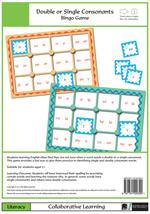 |
Improving AdjectivesDescription: This is an activity to help build vocabulary and enhance creative writing skills. In the context of a connect four game, students are challenged to substitute commonly used adjectives with more interesting ones. Learning Outcomes: Students will have developed their literacy skills by expanding their vocabulary to include a wider variety of adjectives. |
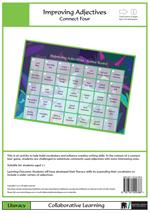 |
Too Many ApostrophesDescription: The use of apostrophes puzzles even adults, so for students learning English it can be even more confusing. Many languages do not have apostrophes or they apply them in a different way, so in this activity we give students practise at identifying where an apostrophe should be placed. Learning Outcomes: Students will have gained a greater understanding of the correct way of using an apostrophe. |
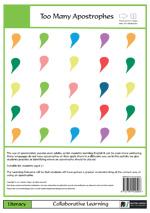 |
Complex SentencesDescription: This activity is designed to improve students’ writing skills and encourage the development of complex sentences as well as the identification of various grammatical features. Learning Outcomes: Pupils will be able to identify grammatical features and increase the complexity of their writing.
|
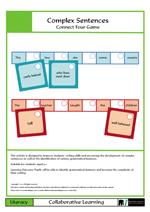 |
Suffix TreesDescription: In this activity we have devised a way that pupils can discover how to change the tens of a word either into the pastor the present continous by adding either "ed" or "ing". Learning Outcomes: Pupils will have improved their spelling by practising adding suffixes to common English verbs. Playing the game also increase pupils vocabulary and writing skills. |
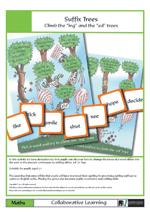 |
Consonant ClustersDescription: Learning to spell is not usually thought of as a fun activity but when you turn it into a game pupils will be more than happy to play and learn at the same time. Learning Outcomes: Pupil will have improved their spelling by practising the writing of words with double and triple consonants. |
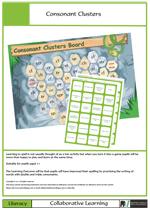 |
Prefix PairsDescription: The matching pairs game has been devised to help pupils with their learning about prefixes and also to expand their vocabulary and improve their spelling. Learning Outcomes: Pupils will be more familiar with prefixes and will be able to give examplesof words to demonstrate this. |
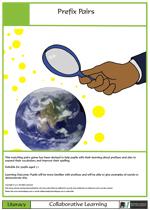 |
Prefix Connect FourDescription: This game has been devised to help pupils develope their literacy skills and practise the use of prefixes through playing the game "Four in a Row". Learning Outcomes: Pupils will have had the opportunity to familiarise themselves with the use of prefixes and can demonstrate this through giving examples of words. |
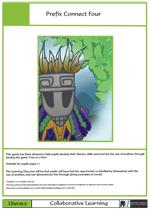 |
Not Again Red Riding Hood (Lotto Game)Description: This Lotto game has been devised to help reinforce pupils memory of the characters fro the "Not Again Red Raiding Hood" book in a fun way. Learning Outcomes: Pupils will have increased their knowledge of Not Again Red Riding Hood and the characters within it. This is a companion game to Not Again Red Riding Hood (Track game). |
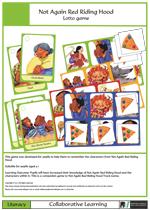 |
Buri and the MarrowDescription: The track game has been devised to encourage pupils to explore the characters and the plots within the Buri and the Marrow book. Learning Outcomes: Pupils will have familiarised themselves with the key vocabulary from the story in a fun way and can answer a series of comprehension questions. |
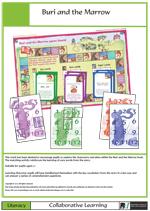 |
Plural Monsters Machine and "One or More than One" Spelling GameDescription: This game has been devised to help pupils to understand the process of plural creation in a fun way and also to expand their vocabulary and improve their spelling. Learning Outcomes: Pupils will be more familiar with plurals and will be able to demonstrate this by giving examples. |
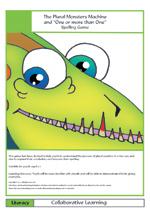 |
Not Again Red Riding Hood (Track Game)Description: This track game has been devised to encourage pupils to explore the themes, characters and plot in relation to the ‘Not Again Red Riding Hood’ book. The activities reinforce the learning of core words from the story. Learning Outcomes: Pupils will have increased their knowledge of Not Again Red Riding Hood and the characters within it. |
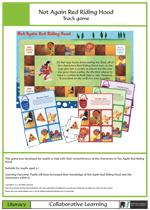 |
Holes - Louis SacharDescription: The novel “Holes” by Louis Sachar is currently very popular with Years 7 and 8. A Character game and a Connect Four game have been devised to help students to memorize the characters of the novel. Learning Outcomes: Students will have reinforced their knowledge of the main characters and some key events within the novel. |
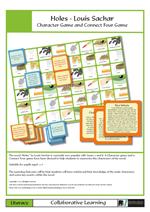 |
Macbeth - Two Minute AutobiographyDescription: Macbeth is one of the most popular Shakespeare plays studied by many students. This game has been devised to help students to memorise the characters within the play. Learning Outcomes: Students will have reinforced their knowledge of the main characters and some key events within the play. |
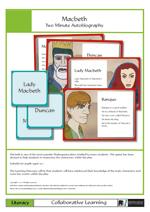 |
Macbeth - Macbeth's FeelingsDescription: This activity will help students to chart the changes in Macbeth’s feelings using quotes from the play and it will reinforce knowledge of Macbeth. Learning Outcomes: Students will gain a deeper understanding of the emotions and feelings of Macbeth throughout the play and they will be able to work together to discuss their ideas. |
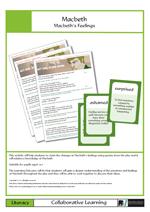 |
Macbeth - Close Look at Act OneDescription: Macbeth is one of the most popular Shakespeare plays studied by many students. This matching game is a fun way to help student to gain a deeper understanding of the characters and of the key events within the first act of the play. Learning Outcomes: Students will be able to demonstrate a greater understanding of the first act of the play and will be able to work collaboratively. |
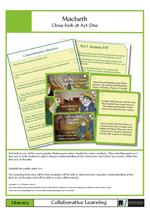 |
Oliver TwistDescription: Oliver Twist is one of the most popular books written by Charles Dickens. This game has been devised to help students to memorise the characters within the book. Learning Outcomes: Students will have reinforced their knowledge of the main characters and some key events within the book. |
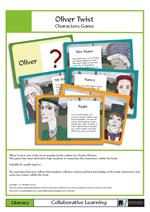 |
Punctuation GameDescription: The correct use of punctuation is a key skill in writing. We have devised a fun activity to help children learn about using punctuation. Learning Outcomes: Students will have gained a greater understanding of the correct ways of using punctuation.
|
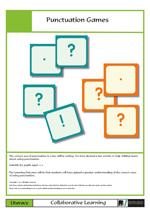 |
The Elves and the ShoemakerDescription: This game has been devised to help reinforce pupils memory of the characters from the ‘Elves and the Shoemaker’ book in a fun way. This will help increase their knowledge of the story line and the characters within it. Learning Outcomes: Pupils will have increased their knowledge of “The Elves and the Shoemaker” book and the characters within it. |
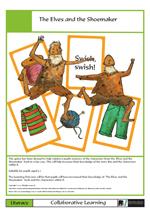 |
Greek Word DetectiveDescription: A Matching game and a Connect four game have been devised to help pupils become aware of the influence of Ancient Greek on the modern English language and how various Greek “roots” (phono, graph, cardio etc.) are combined to make a variety of technical and general words in English. Learning Outcomes: Pupils will have developed their literacy skills through familiarising themselves with words that have Greek “roots”.
|
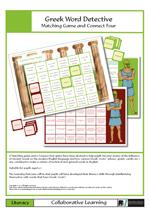 |
It could have happened, but in fact it didn'tDescription: This activity, inspired by “Careful with that Ball, Eugene” by Tohby Riddle, not only encourages the development of complex sentences but also involves the identification of grammatical features. With this game students will increase their vocabulary and writing skills. Learning Outcomes: Pupils will be able to identify grammatical features and increase thecomplexity of their writing. |
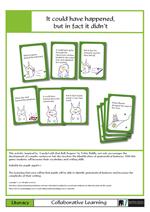 |

